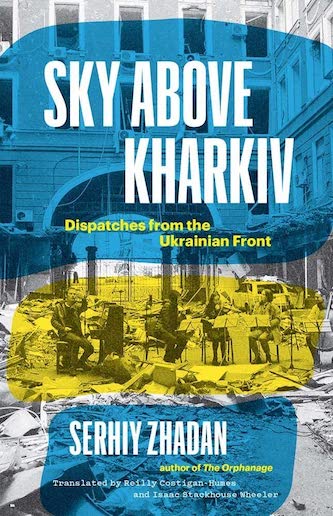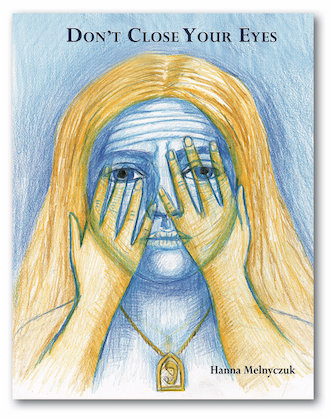Book Reviews: Chronicles of Russia’s War on Ukraine — Hope Is the Thing with Teeth
By Preston Gralla
Two powerful volumes show that Ukraine’s greatest weapons against Russia are hope and unity.
Sky Above Kharkiv: Dispatches from the Ukrainian Front by Serhiy Zhadan. Translated by Reilly Costigan-Humes and Isaac Stackhouse Wheeler. 208 pp. Yale University Press. Hardcover, $26
Don’t Close Your Eyes by Hanna Melnyczuk. 82 pp. Arrowsmith Press. Paperback. $30.
 The pen is mightier than the sword, it’s said, but two just-published books about Russia’s war on Ukraine portray something mightier still: hope. Hope that binds Ukrainian soldiers and civilians in a common defense. Hope that art and culture can defeat brutality and hatred. Hope that children will again see a time when spring heralds blooming flowers after a hard winter, not a time when tanks roll because ice and snow have finally retreated.
The pen is mightier than the sword, it’s said, but two just-published books about Russia’s war on Ukraine portray something mightier still: hope. Hope that binds Ukrainian soldiers and civilians in a common defense. Hope that art and culture can defeat brutality and hatred. Hope that children will again see a time when spring heralds blooming flowers after a hard winter, not a time when tanks roll because ice and snow have finally retreated.
The hope displayed in the books isn’t the pie-in-the-sky kind, not the abstract concept we’ve all been taught to pay lip service to but not to really believe. Instead, it’s hope in action. Hope that spurred the Ukrainian poet, novelist and musician Serhiy Zhadan to organize a network of civilian resistance workers to evacuate children and the elderly from in the Khakiv suburbs when bombs are falling, to raise money to buy equipment for the Ukrainian military, to deliver food to those in need, and to organize concerts to lift people’s spirits in a desperate time of war. Hope that led the Ukrainian-American artist Hanna Melnyczuk to confront the unimaginable acts of war by portraying them in child-like illustrations, and donate the book’s proceeds to Ukraine’s war and recovery efforts.
Zhadan’s Sky Above Kharkiv is a compilation of his Facebook posts about his life in Kharkiv, Ukraine’s second-largest city, from the start of the Russian invasion on February 24, 2022, through June 4, 2022. It captures both his works of aid and resistance and what it felt like living for four months in a city under furious siege.
He’s a novelist, musician, and poet, but takes care not to turn his experiences into raw material for literary output. He writes in his introduction, “Using blood and gore as literary material seems ethically dubious and completely inappropriate … none of this is about literature — it’s about reality.” (Arts Fuse review of Zhadan’s 2022 novel The Orphanage.)
That reality is portrayed unflinchingly, but frequently filtered through a lens of hope. In the war’s first week he tells of Russia firing rockets into the middle of the city, targeting schools and civilians. He writes, “The Russians aren’t an army. They’re criminals.… They can destroy our apartment buildings, but they can’t destroy our contempt for them. Or our hatred.” He also describes his work providing food and medical aid for the wounded and those in need, helping the army by collecting donations and providing badly needed equipment. At one point he reassuringly notes, “Everything will be all right. Everything will be Ukraine.” And through the entire four months, on good days and bad ones, he ends many of his posts with the hopeful refrain, “Tomorrow we’ll wake up one day closer to our victory.”
Above all, he makes clear that the Russian assault is not just on Ukraine’s towns and cities and its people. Instead, it’s an attack on the very idea that the Ukrainian nation and its culture exist, rather than being on offshoot of Russia — a region the Russians call “Little Russia.” This type of assault is nothing new: It has been used by Russia against Ukraine for hundreds of years starting in the time of the Czars, then throughout Soviet times, and now by Putin.
He is determined during the invasion to help Ukraine maintain its cultural identity by organizing concerts. And he writes that this identity is only recently fully emergent, after Zelensky’s election and the election of a new parliament in 2019. That election, he said, brought many younger people into the government, and revitalized the sense of Ukraine’s nationhood, “shedding the swampy legacy of the twentieth century, like mud falling off new, yet well-chosen combat boots.”
As you would expect from the book’s title, he frequently describes the sky above Kharkiv during war as a beacon of hope. The end of one post sums up much of what this book is about. In it he mentions both the great 19th-century Ukraine-born writer Nikolai Gogol, who has generally been considered a Russian, and the 19th-century Ukrainian writer Taras Shevchenko, the founder of Ukrainian literature:
“The evening sky is special. Before I would have said it is Gogolesque. But no, it’s not Gogolesque. It’s Shevchenkoesque. Let’s drop the Little Russian identity. Dream happy dreams. Tomorrow we’ll wake up one day closer to victory.”
 The Ukrainian-American Melnyczuk’s Don’t Close Your Eyes is darker than Zhadan’s and focuses more than his on the horrors of the war. She’s an artist and a children’s book author and chose a picture book format for it: a series of two-page spreads with a short poem or quote on the left, and a child-like illustration on the right.
The Ukrainian-American Melnyczuk’s Don’t Close Your Eyes is darker than Zhadan’s and focuses more than his on the horrors of the war. She’s an artist and a children’s book author and chose a picture book format for it: a series of two-page spreads with a short poem or quote on the left, and a child-like illustration on the right.
Some illustrations are black and white, their simplicity echoing the German artist’s Käthe Kollwitz’s dark expressionistic drawings — notably a barely sketched out illustration of a young girl who comes across a dead Ukrainian man, facedown, hands tied behind his back as rain falls. On the facing page is an excerpt from an Edna St. Vincent Millay poem:
“Time does not bring relief; you all have lied
Who told me time would ease me of my pain!
I miss him in the weeping of the rain.”
Other illustrations are brighter, more child-like, and mix pain and optimism. The very act of putting the images and text on the page like this is an act of hope, a belief that portraying the emotional truth of the toll of war can only lead to good.
Despite the darkness, the book ends on a hopeful note. On the right, an illustration of a young girl’s exquisite face, rising out of a field of golden grain. On the left, a section of a poem from the World War I war poet Siegfried Sassoon:
“The anguish of the earth absolves our eyes
Till beauty shine in all that we can see
War is our scourge; yet war had made us wise,
And, fighting for our freedom, we are free.”
Preston Gralla has won a Massachusetts Arts Council Fiction Fellowship and had his short stories published in a number of literary magazines, including Michigan Quarterly Review and Pangyrus. His journalism has appeared in the Los Angeles Times, Dallas Morning News, USA Today, and Boston Globe Sunday Magazine, among others, and he’s published nearly 50 books of nonfiction which have been translated into 20 languages.
Tagged: Arrowsmith, Hanna Melnyczuk, Serhiy Zhadan, Sky Above Kharkiv: Dispatches from the Ukrainian Front
